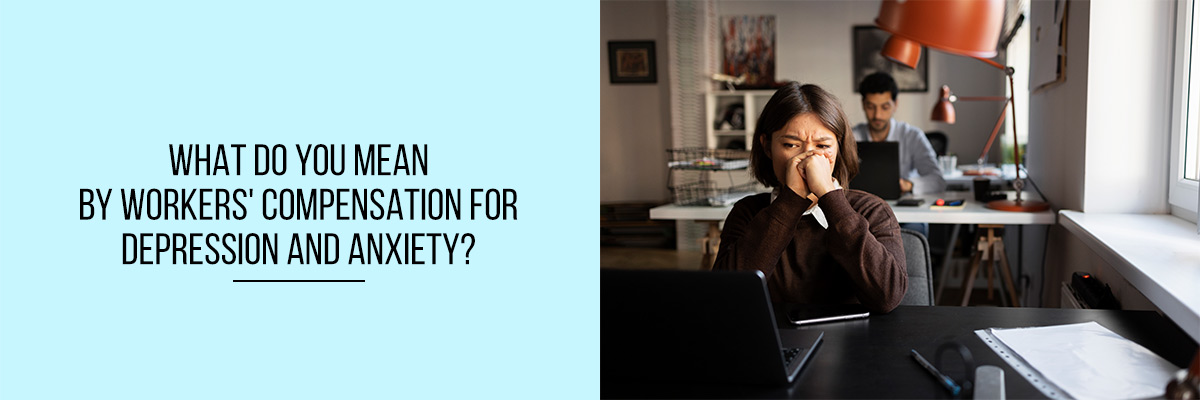Workers’ compensation usually focuses on physical injuries. Even so, mental health problems like depression and anxiety can be just as debilitating.
In recent years, workers’ compensation programs have included mental health conditions as workplace stressors have been recognized as affecting mental health. Therefore, employers and managers must understand how to cope with mental health at work, and understand the compliance requirements if the employee files for compensation.



This blog aims to explore what workers’ compensation for depression and anxiety entails, how it works, and what individuals need to know if they find themselves in such situations.
What is Workers’ Compensation for Depression and Anxiety?
Basically, depression and anxiety benefits refer to benefits and support provided to employees who develop these mental health conditions at work. The same goes for mental health problems caused by work-related stressors or traumatic events.
Understanding Depression and Anxiety in the Workplace:
It’s important to understand how depression and anxiety can manifest at work before diving into workers’ compensation specifics. There are a number of workplace stressors that can contribute to these conditions, including:
- High job demands and workload pressure.
- Low job control or autonomy.
- Poor interpersonal relationships with coworkers or supervisors.
- Bullying or harassment in the workplace.
- Exposure to traumatic events, such as accidents or violence.
- Job insecurity or fear of unemployment.
Mental health issues can result from these stressors, ranging from mild symptoms of stress to severe depression and anxiety. The signs of these conditions need to be recognized early on by both the affected employees and their employers.
Qualifying for Workers’ Compensation:
For depression and anxiety workers’ compensation benefits, you have to prove your mental health condition is directly related to your job. You might need to provide medical evidence, like a diagnosis from a mental health professional, and documentation of the work factors that caused it.
It is important for individuals to become familiar with the specific requirements in their area regarding workers’ compensation laws. It may also be a good idea to seek legal advice or assistance from a workers’ compensation attorney if you believe your claim involves mental health issues.
Types of Benefits Available:
Workers’ compensation benefits for depression and anxiety can vary depending on the severity of the condition and its impact on the individual’s ability to work. Common types of benefits may include:
- Medical Treatment: This includes therapy, medication, and hospitalization if necessary for the treatment of depression and anxiety.
- Disability Benefits: After a mental illness prevents an individual from working or reduces their earning capacity, compensation is provided for lost wages.
- Vocational Rehabilitation: Interventions to assist individuals in retraining or finding alternative employment, if they are unable to return to their previous job due to mental illness.
- Psychological Counseling: Access to counseling services to help the individual cope with and manage their depression and anxiety.
Navigating the Claims Process:
It can be challenging to navigate the workers’ compensation claims process for mental health conditions. It is possible for individuals to face obstacles such as skepticism from employers or insurance companies regarding the validity of their claims.
It can be extremely beneficial for them to seek support from mental health professionals, advocacy organizations, or legal experts at every stage of the process, so that their rights are protected.
Promoting Workplace Mental Health:
While workers’ compensation provides crucial support for individuals who have already developed depression and anxiety due to workplace factors, proactive measures to promote mental health in the workplace are equally important. Employers can take steps to create a supportive work environment that prioritizes employee well-being, such as:
- Assisting in the management of stress and providing mental health resources.
- Assisting employees with counseling and referrals through employee assistance programs (EAPs).
- Preventing harassment and discrimination in the workplace by implementing policies.
- Promoting work-life balance and encouraging employees to take breaks and time off when needed.
- Supporting supervisors and managers in recognizing and responding to signs of mental distress.
By addressing workplace stressors and fostering a culture of support and understanding, employers can help prevent mental health issues from arising in the first place, ultimately benefiting both employees and the organization as a whole.
Conclusion:
When mental health issues arise at work, workers’ compensation ensures that employees get the support they need. People can advocate for their rights and access the resources they need for recovery by understanding the causes and symptoms of these conditions, as well as the benefits available and the claims process. Also, promoting mental health at work can prevent depression and anxiety, resulting in a healthier, more productive workplace.


